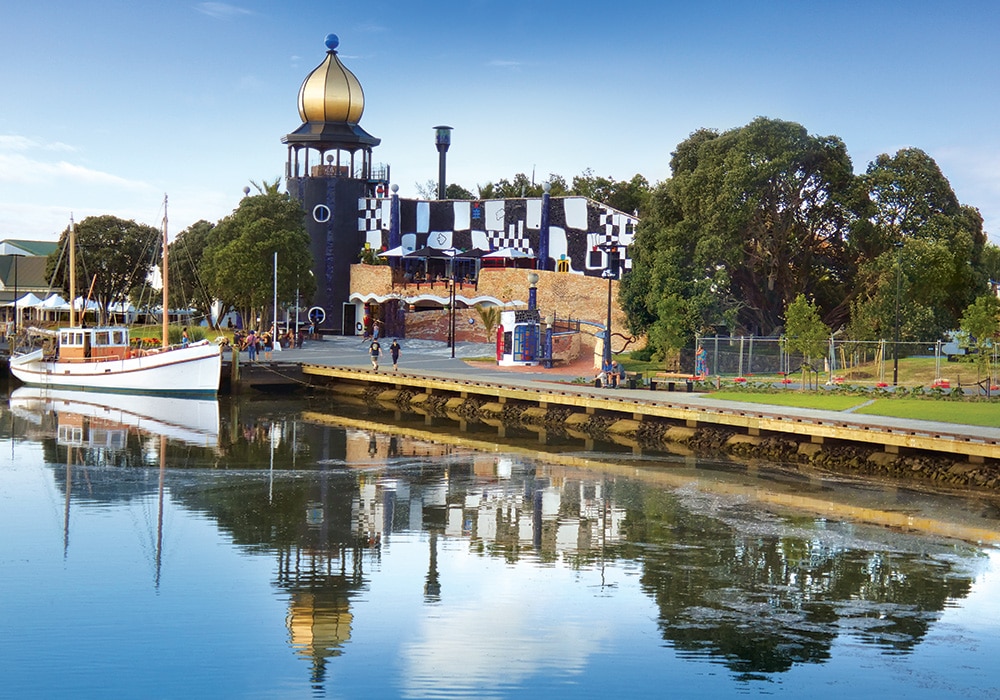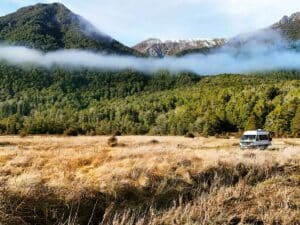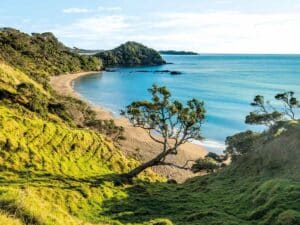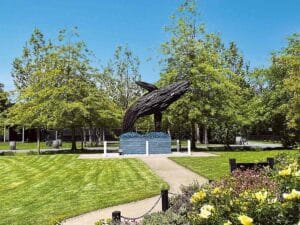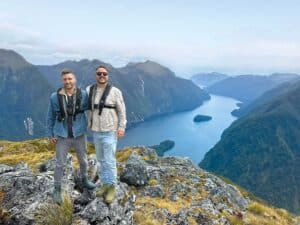From Whangārei’s Town Basin’s Hundertwasser building to Kawakawa’s toilets, Northland is an aesthetic wonderland. Heather Whelan was there for the opening of the latest must-see art destination.
This February saw the long-awaited opening of Whangārei’s Hundertwasser Art Centre. It’s a lot more than your average gallery – it’s a very original experience of art and nature in perfect harmony. The space includes the Wairau Māori Art Gallery, and the centre is housed in a massive, eye-catching and unique example of Hundertwasser’s architecture.
Austrian-born artist, architect and conservationist Friedensreich Hundertwasser first visited New Zealand in 1973, buying land in the Bay of Islands three years later. He was already well known in Europe for his conservation beliefs and quirky architecture, and it didn’t take long before he began applying his art and ideals here. In 1974 his first Conservation Week poster highlighted the need for the protection of our natural environment, and in 1983 he gifted the green and white unfurling fern koru flag, which he designed as an alternative design for our national flag, to New Zealand.
In 1998 Hundertwasser was invited to design an art gallery for Whangārei by the then mayor, Stan Semenoff. Twenty-four years later, the gallery and building have become a reality, a fantastic asset for Whangārei and a lasting tribute to Hundertwasser, who died in 2000 and is buried at his Hundertwasser estate in Kawakawa.
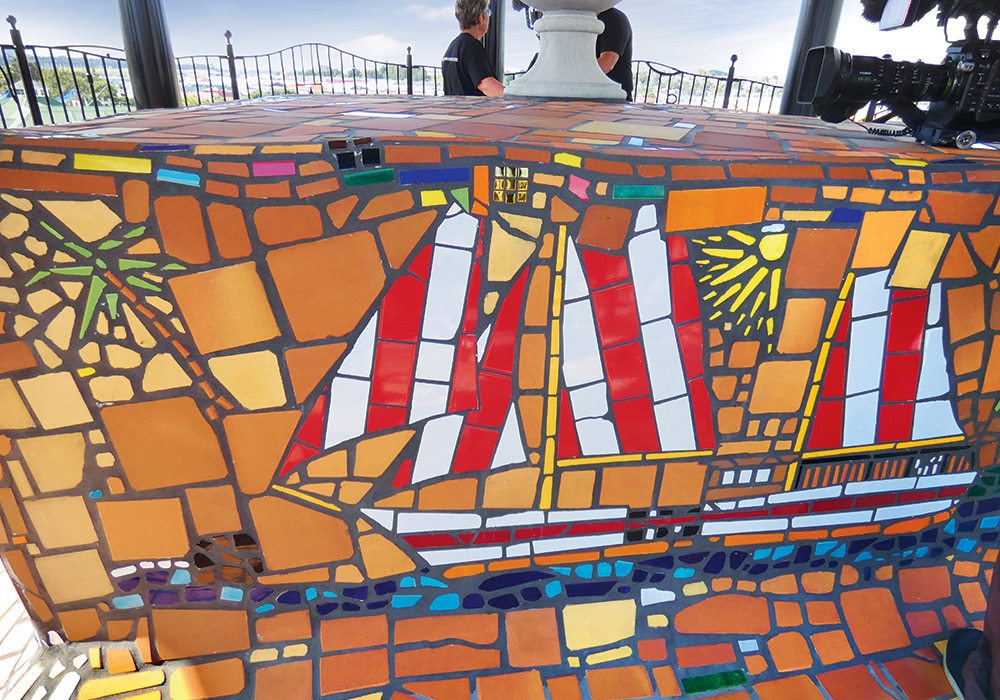
Building an icon
The Hundertwasser Art Centre building is a piece of art in its own right. Topped with an eight-metre tall, 3.5-tonne, $50,000 gold leaf cupola, it has an afforested rooftop, curving architecture and eye-catching mosaics. A crowd of more than 1000 gathered to watch it being craned into place after being barged upriver last year, and since then it has drawn locals and visitors alike to watch the building and landscaping draw to completion.
Hundertwasser was very influenced by nature, and believed straight lines in architecture were soulless, that buildings should give back to nature by having afforested roofs. As a result, more than 4000 trees, including rare and native species, have been planted on the building’s roof. Honouring Hundertwasser’s principles, the building has used 40,000 recycled bricks, 5000 recycled pavers and 3000 square metres of locally made tiles. Mosaics on the mainly black and white exterior have icons such as waka and kiwi incorporated into their designs; it’s for kids and adults alike to walk around and spot them. The building faces Whangārei’s Town Basin Marina and links to it by new landscaping, featuring an undulating tiled area with koru shaped mosaics, a European-style fountain and quirky sculpture.
Opened last year, the Aqua Café and Restaurant is situated on the building’s first floor. While having a coffee, lunch or dinner here, you can look down on the yachts in the basin from the outside area or enjoy more Hundertwasser- themed art and architecture inside. Even the café’s toilets are embellished with curves and mosaics.
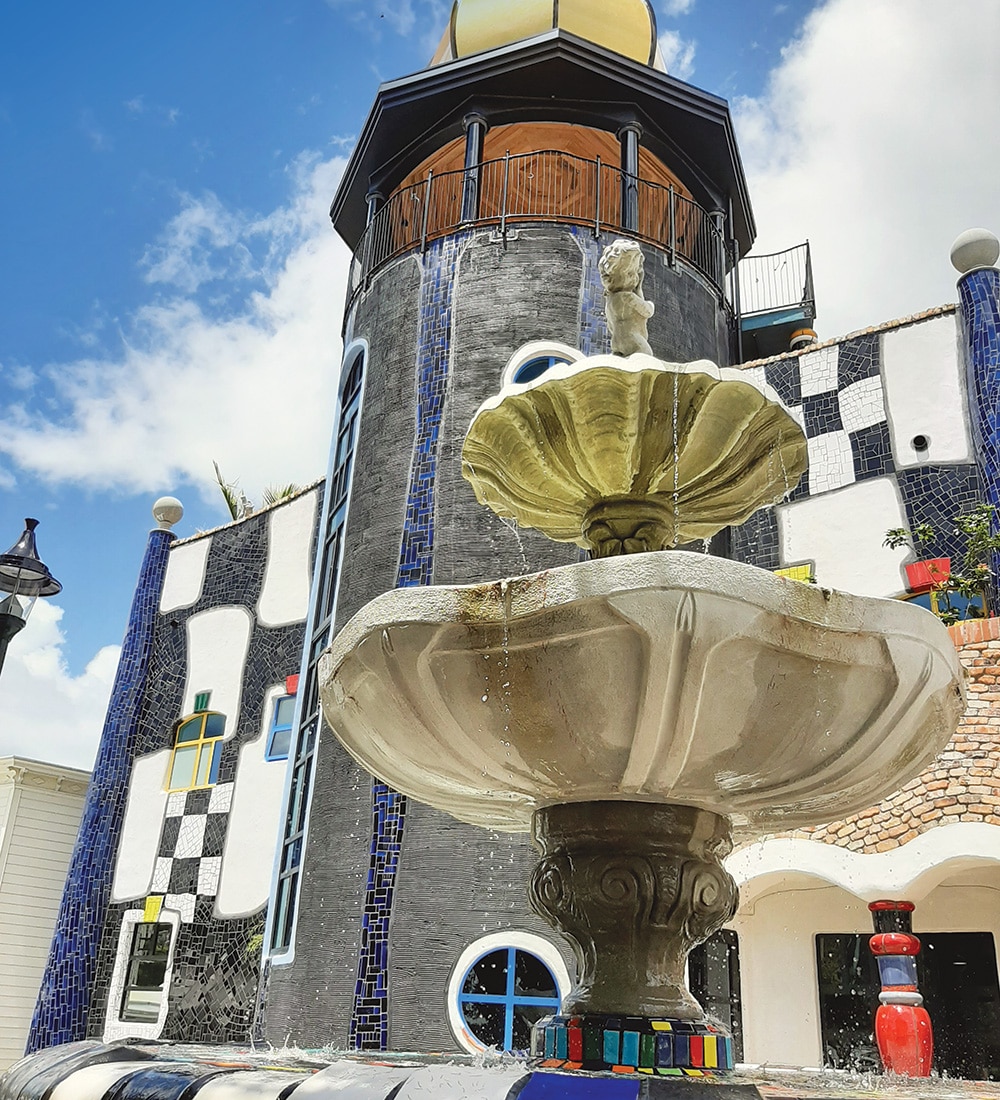
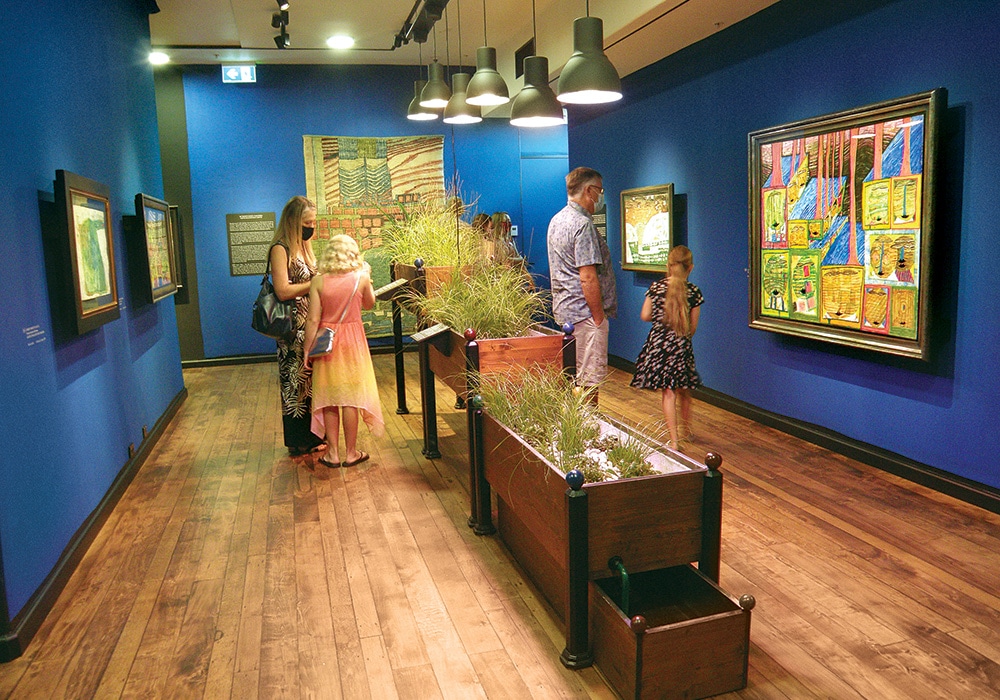
A gallery of galleries
Inside the building are two art galleries: the Wairau Māori Art Gallery on the ground floor, while on the first floor is a large exhibition, Hundertwasser In New Zealand 1973-2000.
The Wairau Gallery is New Zealand’s only gallery featuring nationally and internationally recognised contemporary Māori art. Wairau in te teo Māori means One Hundred Waters, as does the name Hundertwasser in German: both names were chosen for their symbolism (Hundertwasser’s surname was originally Stowasser; he changed it at the end of WW2 as his mother, Elsa, was Jewish).
Up a staircase decorated with mosaics, the Hundertwasser gallery encompasses the Viennese-born artist’s life and works. There are photographs, architectural models, tapestries, posters and original artworks. There’s also a composting toilet, illustrating Hundertwasser’s environmental stance.
A spiral staircase leads to the rooftop garden and the cupola. The views of the surrounding landscaping and across the river are beautiful. The garden has seating and is a peaceful oasis in the city.
For something completely different, head to Whangārei Art Museum beside the Hundertwasser building. This gallery is home to Whangārei’s art collection, holding both heritage and contemporary works. The museum also curates exhibitions from Northland, New Zealand and the world. Current exhibitions are Machine in the Garden (until 4 May) and the amazing Life Puzzle, an insightful observational comedy by Whangārei-born artis Nick Austin (until 10 July).
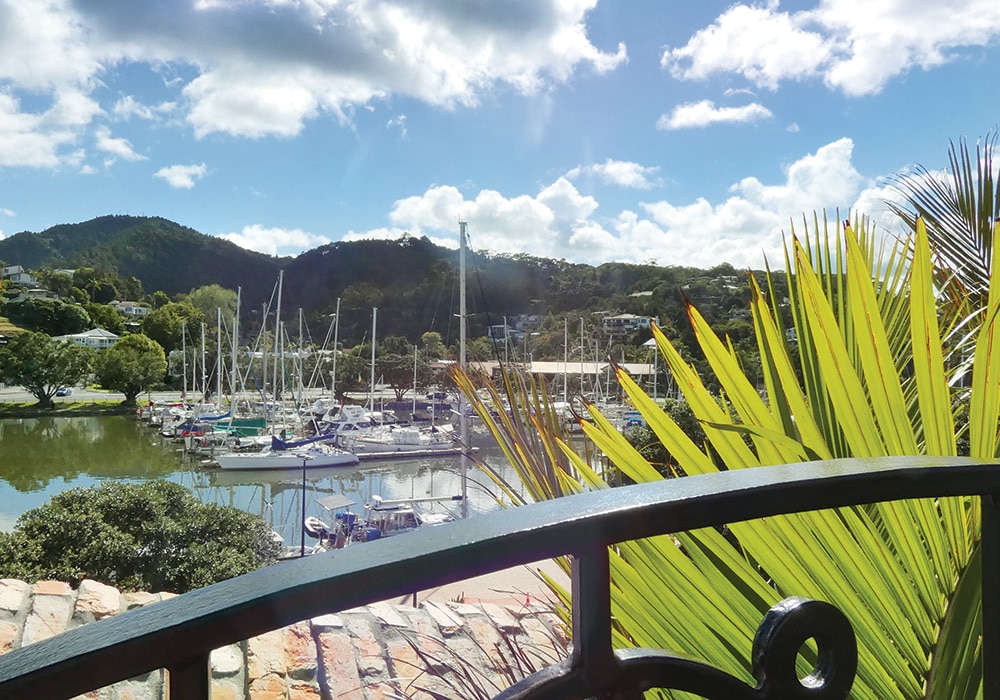
World Famous in New Zealand
The small town of Kawakawa is just over half an hour north of Whangārei. In 1998 Hundertwasser worked with the Kawakawa community to build the toilets that have become the town’s major tourist attraction. With Hundertwasser’s trademark wavy lines, coloured glass and ceramic tiles, it’s one of the few toilet blocks in the world that is seen as a work of art. True to his ideals, recycled materials such as glass bottles and bricks from the former BNZ branch were used, and a living tree grows through the structure. The toilets have a ‘green roof’, where vegetation removed during construction has been rehomed. The toilets are fully functional but many more people enter to look and take photographs than to actually use them.
Joining of hearts
Kawakawa’s cultural hub, Te Hononga Hundertwasser Memorial Park, is adjacent to the toilets. The design of the centre’s building is two hearts coming together, symbolising the community and Hundertwasser, Māori and Pakeha, visitors and residents.
Te Hononga came into being after a trust was formed in 2009 to preserve Hundertwasser’s legacy in Kawakawa. As well as caring for the toilets, a park was established and in 2020 the cultural hub building was opened. The building houses the library, a council service centre, the Hundertwasser Memorial Interpretive Centre, and upstairs a gallery of his art.
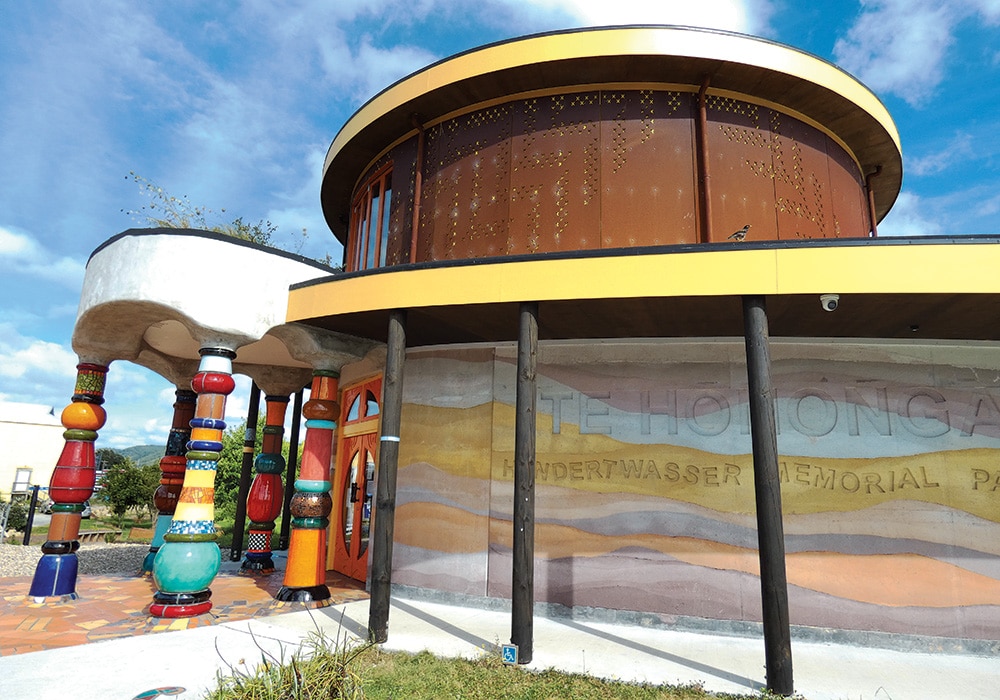
Showered with art
Behind the Te Hononga building there is a big area for parking, including overnight freedom camping. What’s fantastic about this site is that the toilets and showers, located on the outside of the building, are decorated in true Hundertwasser style so you can admire your surroundings as you freshen up.
Across the road there’s the Grass Hut, a shop selling Hundertwasser prints and books as well as New Zealand arts
and crafts. It’s in keeping with the area as it has brightly coloured, Hundertwasser-inspired pillars and a living roof. Next door,
39 Gillies Cafe has mosaic tiling, funky sculptures and a view of the famous toilets.
A worthwhile side trip
Russell Road is about halfway between Whangārei and Kawakawa. If you take this turn, it’s about 15 minutes’ drive to Helena Bay Gallery and Café. The gallery showcases New Zealand artists, many of whom are Northland based. You’ll find paintings, hand-made furniture, sculpture, glass, ceramics, jewellery and more. Outside there’s a pond (listen out for the frogs) and a sculpture garden.
The adjacent café must have one of the best views around. From the outdoor deck area,bush-clad slopes lead down to the coast where the sea stretches to the horizon. It’s a great place to relax while taking a break from exploring Northland’s amazing art galleries.
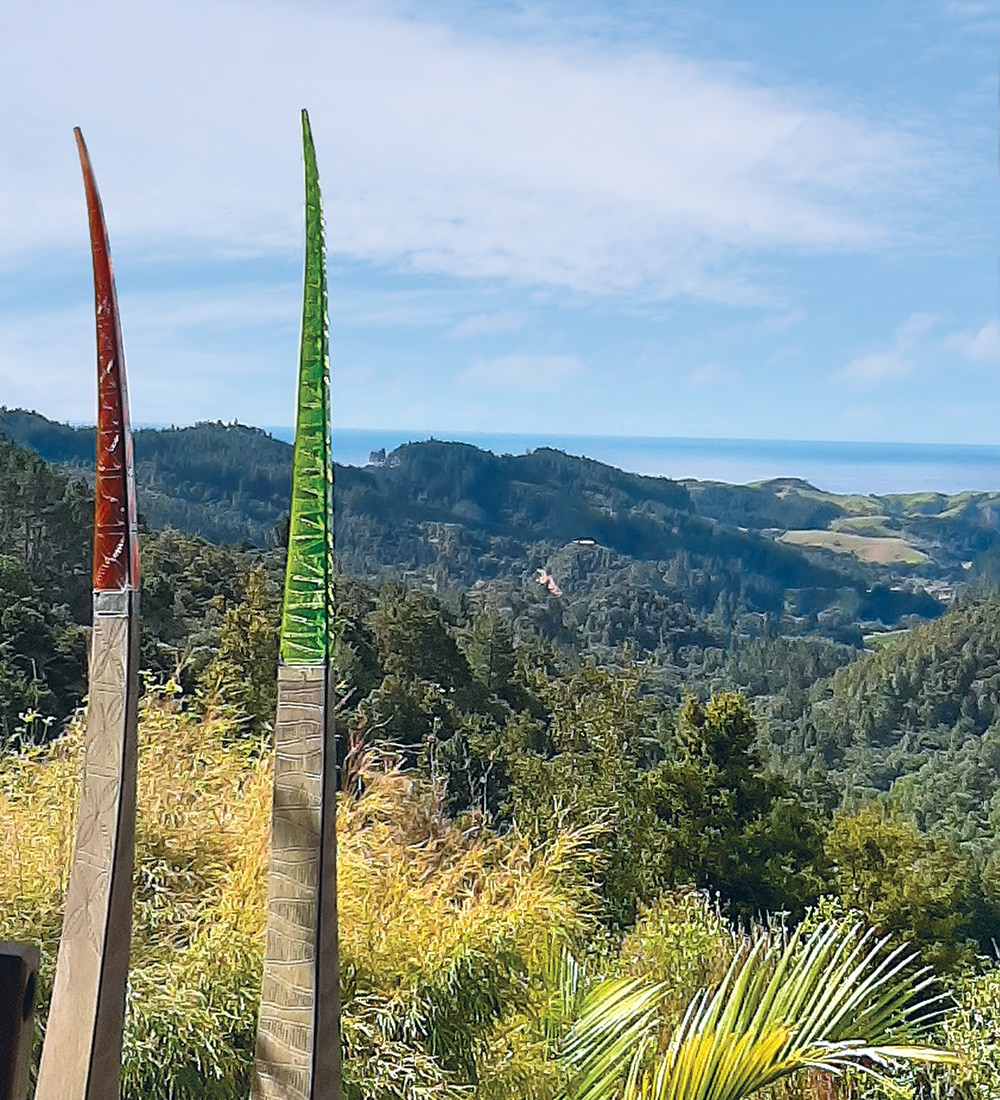
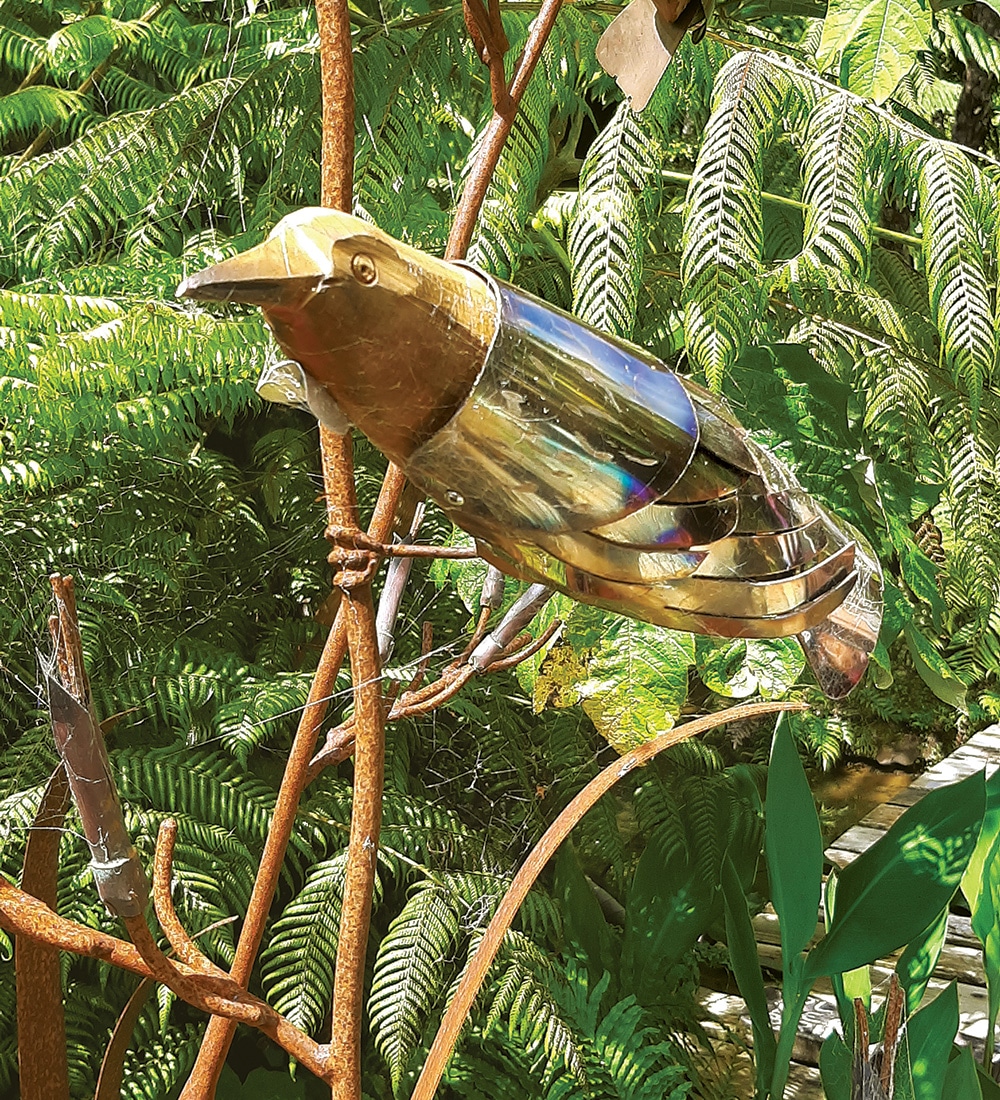
Further Information
There are many other galleries to discover in Northland. Some others in Whangārei’s Town Basin area are Reyburn House, Burning Issues and Hihiaua Cultural Centre, while across town there’s the Quarry Arts Centre.
Useful websites: For further information about the Hundertwasser Art Centre; for Kawakawa’s Te Hononga; for Whangārei Art Museum.
For details about Helena Bay Gallery and Café: galleryhelenabay.co.nz and helenabaycafe.co.nz
Looking for motorhomes or caravans for sale in NZ? Browse our latest listings here.

